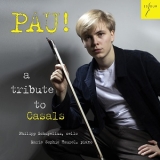Der junge deutsche Cellist Philipp Schupelius – er gewann 20120 den ICMA Discovery Award und 2023 den Fanny Mendelssohn Förderpreis – beginnt sein Programm mit der Gambensonate BWV 1028 von Johann Sebastian Bach. Sie erklingt in einer flüssigen und eleganten Interpretation, die die wuchtigere Artikulation der originalen Gambe vergessen lässt.
Es folgt, sehr ausdrucksvoll, Louange à l’Éternité de Jésus, der 5. Satz aus dem Quatuor pour la fin du Temps von Olivier Messiaen. Hier stören mich jedoch das übertriebene Vibrato des Cellisten und das etwas kalte Spiel der Pianistin. Da gefallen mir die Aufnahme mit Anner Bylsma und Reinbert de Leeuw oder William Pleeth und Michel Béroff viel besser.
Auch das Intermezzo aus Goyescas will mir wegen des aufdringlichen Klaviers nicht richtig gefallen, obschon Schupelius das Stück hingebungsvoll singt.
Die Cellosonate von Beethoven wird inspiriert und kontrastreich gespielt, aber das Klavier ist wiederum etwas zu dominant.
Viel freier und rhetorischer agiert Schupelius in der Solosonate op. 28 von Eugène Ysaÿe, die er mit großartiger technischer Kompetenz, souverän, leidenschaftlich und höchst musikalisch spielt.
Pablo Casals’ einfühlsam gespieltes Stück Song of the Birds beendet dieses Programm.
The young German cellist Philipp Schupelius – who won the ICMA Discovery Award in 20120 and the Fanny Mendelssohn Förderpreis in 2023 – begins his program with the Gamba Sonata BWV 1028 by Johann Sebastian Bach. It is heard in a fluid and elegant interpretation that makes one forget the more massive articulation of the original viola da gamba.
It is followed, very expressively, by Louange à l’Éternité de Jésus, the 5th movement from the Quatuor pour la fin du Temps by Olivier Messiaen. Here, however, the cellist’s exaggerated vibrato and the pianist’s somewhat cold playing bother me. I like the recording with Anner Bylsma and Reinbert de Leeuw or William Pleeth and Michel Béroff much better.
I also don’t really like the Intermezzo from Goyescas because of the intrusive piano, although Schupelius sings the piece devotedly.
Beethoven’s Cello Sonata is played with inspiration and contrast, but the piano is again a bit too dominant.
Schupelius is much freer and more rhetorical in Eugène Ysaÿe’s Solo Sonata, Op. 28, which he plays with superb technical competence, confidently, passionately and most musically.
Pablo Casals’ sensitively played piece Song of the Birds concludes this program.






















